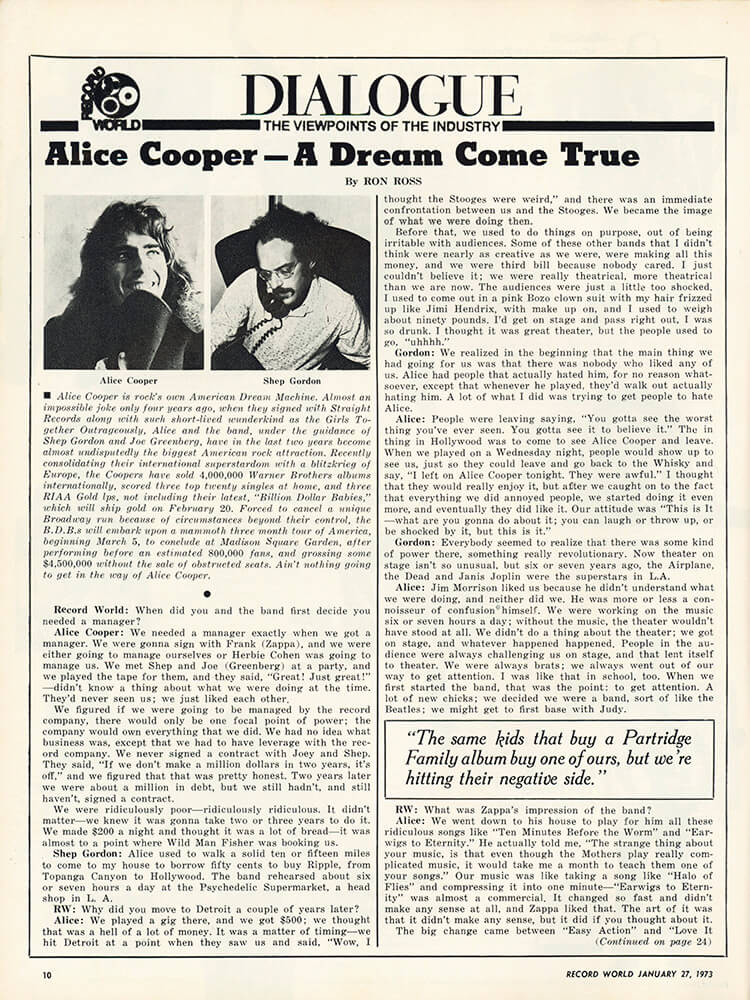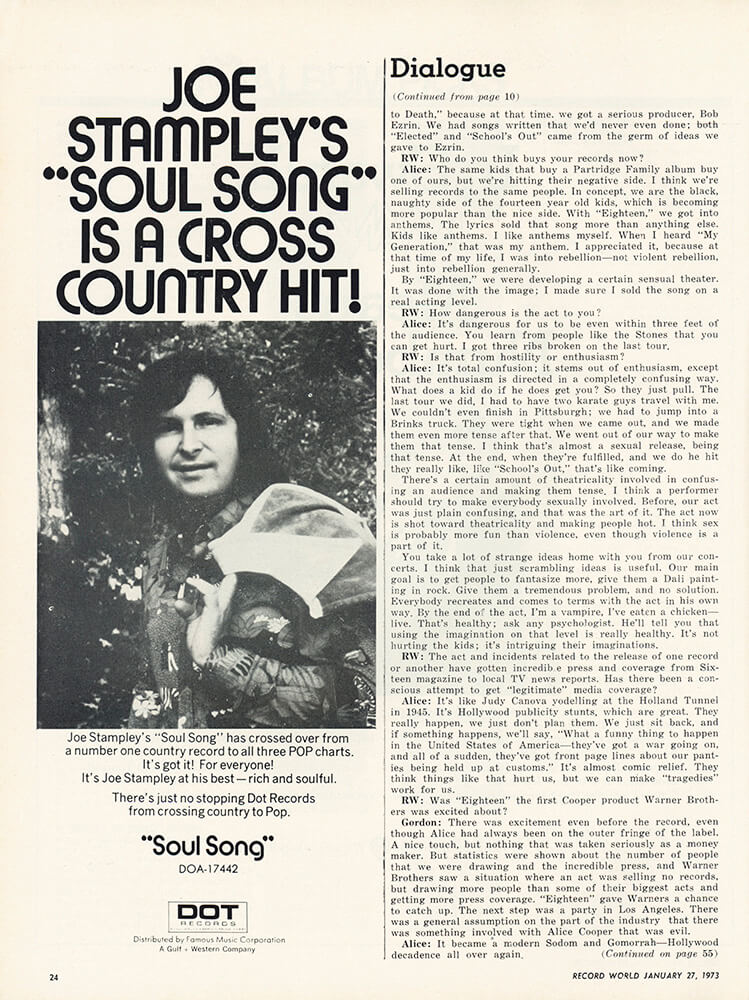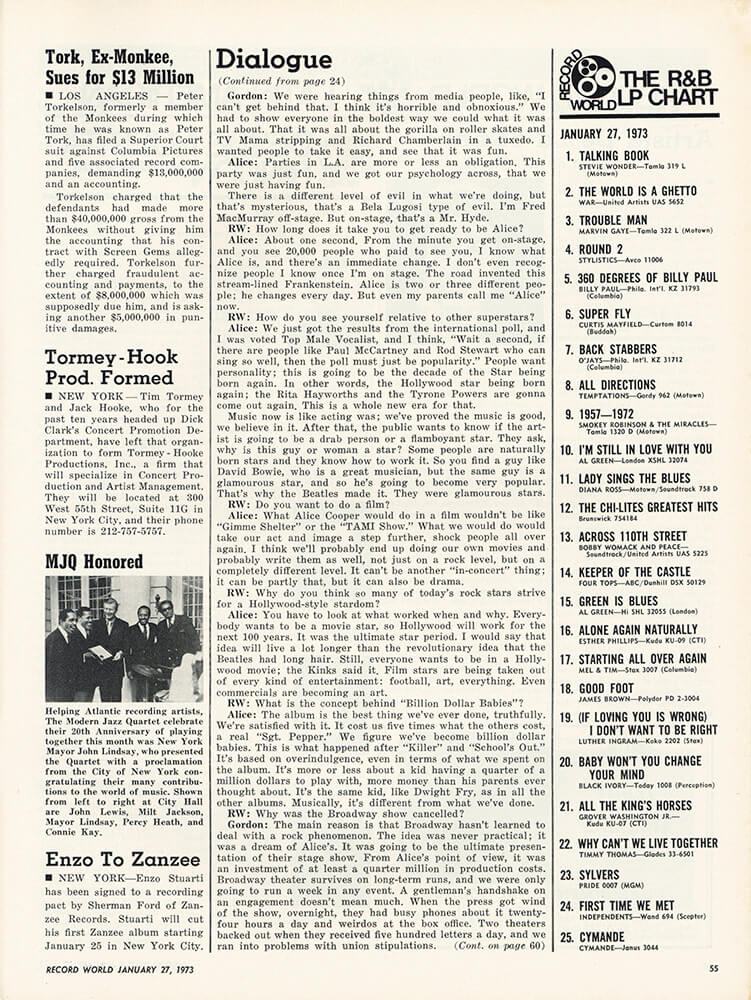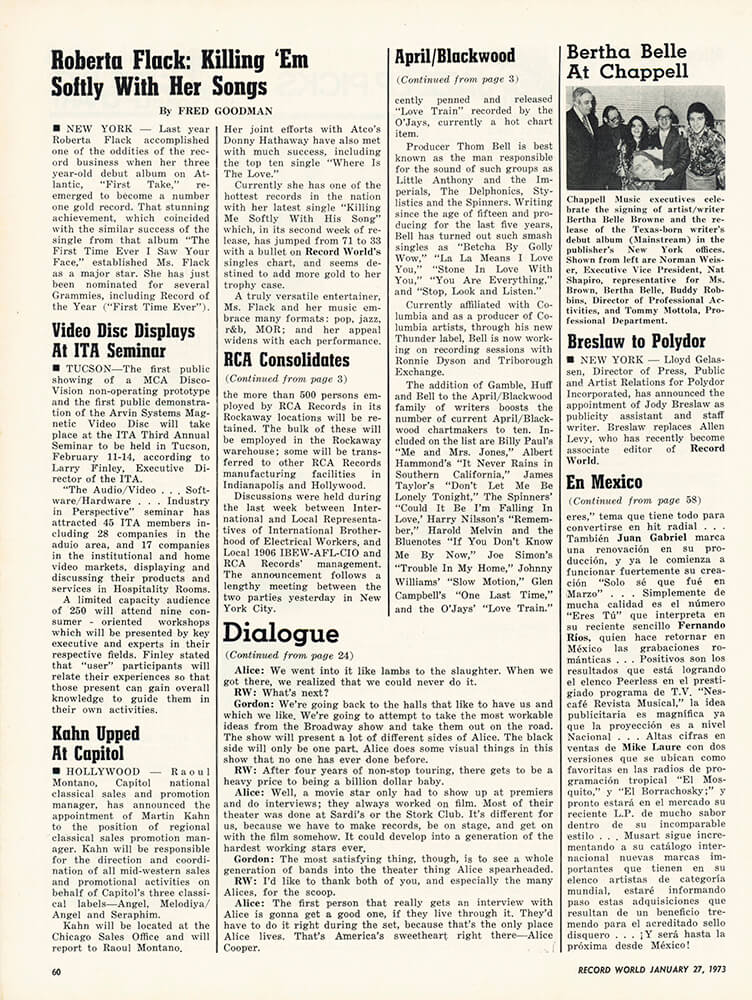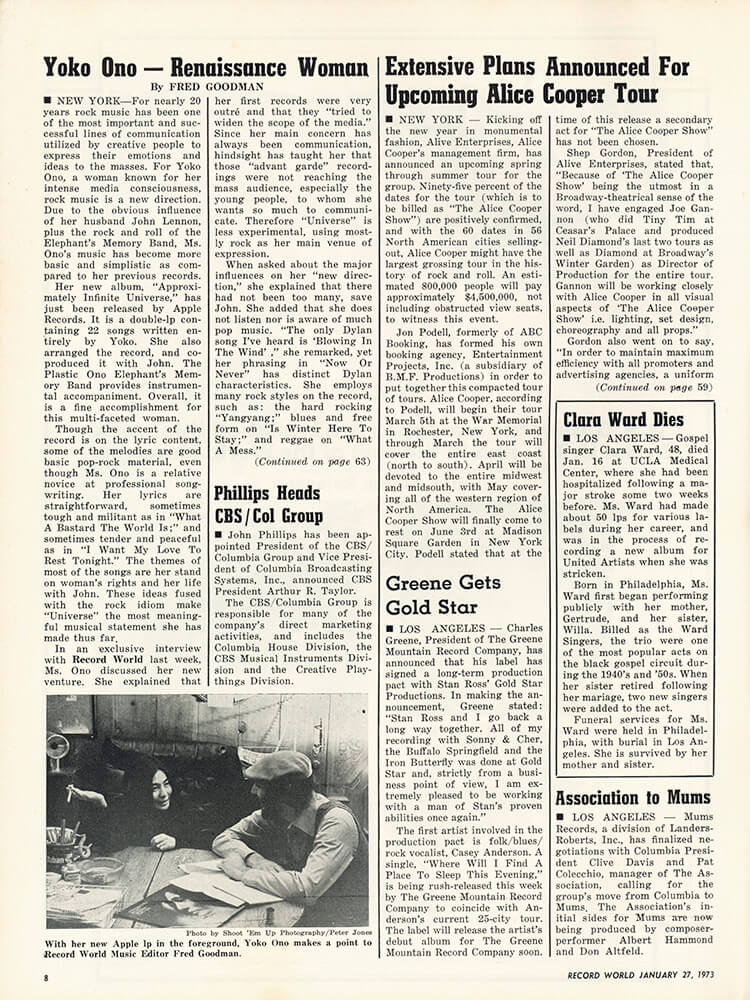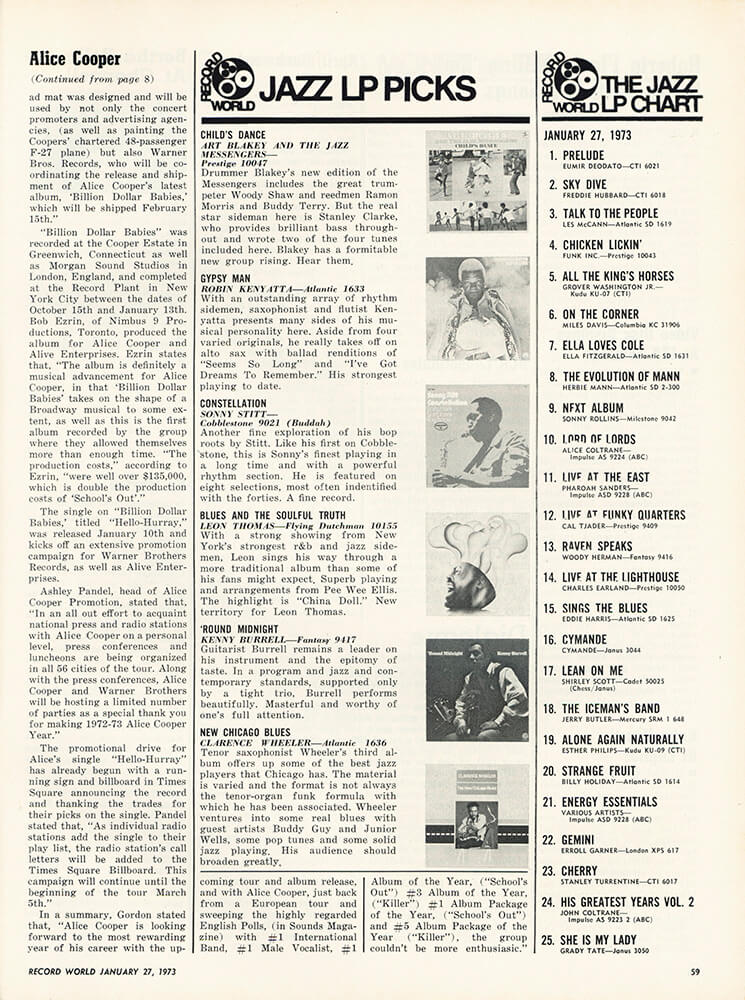Article Database
Alice Cooper — A Dream Come True
Alice Cooper is rock's own American Dream Machine. Almost an impossible joke only four years ago, when they signed with Straight Records along with such short-lived wunderkind as the Girls Together Outrageously, Alice and the band, under the guidance of Shep Gordon and Joe Greenberg, have in the last two years become almost undisputedly the biggest American rock attraction. Recently consolidating their international superstardom with a blitzkrieg of Europe, the Coopers have sold 4,000,000 Warner Brothers albums internationally, scored three top twenty singles at home, and three RIAA Gold lps, not including their latest, "Billion Dollar Babies," which will ship gold on February 20. Forced to cancel a unique Broadway run because of circumstances beyond their control, the B.D.B.s will embark upon a mammoth three month tour of America, beginning March 5, to conclude at Madison Square Garden, after performing before an estimated 800,000 fans, and grossing some $4,500,000 without the sale of obstructed seats. Ain't nothing going to get in the way of Alice Cooper.
Record World: When did you and the band first decide you needed a manager?
Alice Cooper: We needed a manager exactly when we got a manager. We were gonna sign with Frank (Zappa), and we were either going to manage ourselves or Herbie Cohen was going to manage us. We met Shep and Joe (Greenberg) at a party, and we played the tape for them, and they said, "Great! Just great!" — didn't know a thing about what we were doing at the time. They'd never seen us; we just liked each other.
We figured if we were going to be managed by the record company, there would only be one focal point of power; the company would own everything that we did. We had no idea what business was, except that we had to have leverage with the record company. We never signed a contract with Joey and Shep.
They said, "If we don't make a million dollars in two years, it's off," and we figured that that was pretty honest. Two years later we were about a million in debt, but we still hadn't, and still haven't, signed a contract.
We were ridiculously poor — ridiculously ridiculous. It didn't matter — we knew it was gonna take two or three years to do it. We made $200 a night and thought it was a lot of bread — it was almost to a point where Wild Man Fisher was booking us.
Shep Gordon: Alice used to walk a solid ten or fifteen miles to come to my house to borrow fifty cents to buy Ripple, from Topanga Canyon to Hollywood. The band rehearsed about six or seven hours a day at the Psychedelic Supermarket, a head shop in L. A.
RW: Why did you move to Detroit a couple of years later?
Alice: We played a gig there, and we got $500; we thought that was a hell of a lot of money. It was a matter of timing — we hit Detroit at a point when they saw us and said, "Wow, I thought the Stooges were weird," and there was an immediate confrontation between us and the Stooges. We became the image of what we were doing then.
Before that, we used to do things on purpose, out of being irritable with audiences. Some of these other bands that I didn't think were nearly as creative as we were, were making all this money, and we were third bill because nobody cared. I just couldn't believe it; we were really theatrical, more theatrical than we are now. The audiences were just a little too shocked. I used to come out in a pink Bozo clown suit with my hair frizzed up like Jimi Hendrix, with make up on, and I used to weigh about ninety pounds. I'd get on stage and pass right out, I was so drunk. I thought it was great theater, but the people used to go, "uhhhh."
Gordon: We realized in the beginning that the main thing we had going for us was that there was nobody who liked any of us. Alice had people that actually hated him, for no reason whatsoever, except that whenever he played, they'd walk out actually hating him. A lot of what I did was trying to get people to hate Alice.
Alice: People were leaving saying, "You gotta see the worst thing you've ever seen. You gotta see it to believe it." The in thing in Hollywood was to come to see Alice Cooper and leave. When we played on a Wednesday night, people would show up to see us, just so they could leave and go back to the Whisky and say, "I left on Alice Cooper tonight. They were awful." I thought that they would really enjoy it, but after we caught on to the fact that everything we did annoyed people, we started doing it even more, and eventually they did like it. Our attitude was "This is It — what are you gonna do about it; you can laugh or throw up, or be shocked by it, but this is it."
Gordon: Everybody seemed to realize that there was some kind of power there, something really revolutionary. Now theater on stage isn't so unusual, but six or seven years ago, the Airplane, the Dead and Janis Joplin were the superstars in L.A.
Alice: Jim Morrison liked us because he didn't understand what we were doing, and neither did we. He was more or less a connoisseur of confusion himself. We were working on the music six or seven hours a day; without the music, the theater wouldn't have stood at all. We didn't do a thing about the theater; we got on stage, and whatever happened happened. People in the audience were always challenging us on stage, and that lent itself to theater. We were always brats; we always went out of our way to get attention. I was like that in school, too. When we first started the band, that was the point: to get attention. A lot of new chicks; we decided we were a band, sort of like the Beatles; we might get to first base with Judy.
RW: What was Zappa's impression of the band?
Alice: We went down to his house to play for him all these ridiculous songs like "Ten Minutes Before the Worm" and "Earwigs to Eternity." He actually told me, "The strange thing about your music is that even though the Mothers play really complicated music, it would take me a month to teach them one of your songs." Our music was like taking a song like "Halo of Flies" and compressing it into one minute — "Earwigs to Eternity" was almost a commercial. It changed so fast and didn't make any sense at all, and Zappa liked that. The art of it was that it didn't make any sense, but it did if you thought about it.
The big change came between "Easy Action" and "Love It To Death," because at that time. we got a serious producer, Bob Ezrin. We had songs written that we'd never even done; both "Elected" and "School's Out" came from the germ of ideas we gave to Ezrin.
RW: Who do you think buys your records now?
Alice:
By "Eighteen," we were developing a certain sensual theater. It was done with the image; I made sure I sold the song on a real acting level.
RW: How dangerous is the act to you?
Alice: It's dangerous for us to be even within three feet of the audience. You learn from people like the Stones that you can get hurt. I got three ribs broken on the last tour.
RW: Is that from hostility or enthusiasm?
Alice: It's total confusion; it stems out of enthusiasm, except that the enthusiasm is directed in a completely confusing way. What does a kid do if he does get you? So they just pull. The last tour we did, I had to have two karate guys travel with me. We couldn't even finish in Pittsburgh; we had to jump into a Brinks truck. They were tight when we came out, and we made them even more tense after that. We went out of our way to make them that tense. I think that's almost a sexual release, being that tense. At the end, when they're fulfilled, and we do the hit they really like, like "School's Out," that's like coming.
There's a certain amount of theatricality involved in confusing an audience and making them tense. I think a performer should try to make everybody sexually involved. Before, our act was just plain confusing, and that was the art of it. The act now is shot toward theatricality and making people hot. I think sex is probably more fun than violence, even though violence is a part of it.
You take a lot of strange ideas home with you from our concerts. I think that just scrambling ideas is useful. Our main goal is to get people to fantasize more, give them a Dali painting in rock. Give them a tremendous problem, and no solution. Everybody recreates and comes to terms with the act in his own way. By the end of the act, I'm a vampire, I've eaten a chicken live. That's healthy; ask any psychologist. He'll tell you that using the imagination on that level is really healthy. It's not hurting the kids; it's intriguing their imaginations.
RW: The act and incidents related to the release of one record or another have gotten incredibìe press and coverage from Sixteen magazine to local TV news reports. Has there been a conscious attempt to get "legitimate" media coverage?
Alice: It's like Judy Canova yodeling at the Holland Tunnel in 1945. It's Hollywood publicity stunts, which are great. They really happen, we just don't plan them. We just sit back, and if something happens, we'll say, "What a funny thing to happen in the United States of America — they've got a war going on, and all of a sudden, they've got front page lines about our panties being held up at customs." It's almost comic relief. They think things like that hurt us, but we can make "tragedies" work for us.
RW: Was "Eighteen" the first Cooper product Warner Brothers was excited about?
Gordon: There was excitement even before the record, even though Alice had always been on the outer fringe of the label. A nice touch, but nothing that was taken seriously as a money maker. But statistics were shown about the number of people that we were drawing and the incredible press, and Warner Brothers saw a situation where an act was selling no records, but drawing more people than some of their biggest acts and getting more press coverage. "Eighteen" gave Warners a chance to catch up. The next step was a party in Los Angeles. There was a general assumption on the part of the industry that there was something involved with Alice Cooper that was evil.
Alice: It became a modern Sodom and Gomorrah — Hollywood decadence all over again.
Gordon: We were hearing things from media people, like, "I can't get behind that. I think it's horrible and obnoxious." We had to show everyone in the boldest way we could what it was all about. That it was all about the gorilla on roller skates and TV Mama stripping and Richard Chamberlain in a tuxedo. I wanted people to take it easy, and see that it was fun.
Alice: Parties in L.A. are more or less an obligation. This party was just fun, and we got our psychology across, that we were just having fun.
There is a different level of evil in what we're doing, but that's mysterious, that's a Bela Lugosi type of evil. I'm Fred MacMurray off-stage. But on-stage, that's a Mr. Hyde.
RW: How long does it take you to get ready to be Alice?
Alice: About one second. From the minute you get on-stage, and you see 20,000 people who paid to see you, I know what Alice is, and there's an immediate change. I don't even recognize people I know once I'm on stage. The road invented this streamlined Frankenstein. Alice is two or three different people; he changes every day. But even my parents call me "Alice" now.
RW: How do you see yourself relative to other superstars?
Alice: We just got the results from the international poll, and I was voted Top Male Vocalist, and I think, "Wait a second, if there are people like Paul McCartney and Rod Stewart who can sing so well, then the poll must just be popularity." People want personality; this is going to be the decade of the Star being born again. In other words, the Hollywood star being born again; the Rita Hayworths and the Tyrone Powers are gonna come out again. This is a whole new era for that.
Music now is like acting was; we've proved the music is good, we believe in it. After that, the public wants to know if the artist is going to be a drab person or a flamboyant star. They ask, why is this guy or woman a star? Some people are naturally born stars and they know how to work it. So you find a guy like David Bowie, who is a great musician, but the same guy is a glamourous star, and so he's going to become very popular. That's why the Beatles made it. They were glamourous stars.
RW: Do you want to do a film?
Alice: What Alice Cooper would do in a film wouldn't be like "Gimme Shelter" or the "TAMI Show." What we would do would take our act and image a step further, shock people all over again. I think we'll probably end up doing our own movies and probably write them as well, not just on a rock level, but on a completely different level. It can't be another "in-concert" thing; it can be partly that, but it can also be drama.
RW: Why do you think so many of today's rock stars strive for a Hollywood-style stardom?
Alice: You have to look at what worked when and why. Everybody wants to be a movie star, so Hollywood will work for the next 100 years. It was the ultimate star period. I would say that idea will live a lot longer than the revolutionary idea that the Beatles had long hair. Still, everyone wants to be in a Hollywood movie; the Kinks said it. Film stars are being taken out of every kind of entertainment: football, art, everything. Even commercials are becoming an art.
RW: What is the concept behind "Billion Dollar Babies"?
Alice: The album is the best thing we've ever done, truthfully. We're satisfied with it. It cost us five times what the others cost, a real "Sgt. Pepper." We figure we've become billion dollar babies. This is what happened after "Killer" and "School's Out." It's based on overindulgence, even in terms of what we spent on the album. It's more or less about a kid having a quarter of a million dollars to play with, more money than his parents ever thought about. It's the same kid, like Dwight Fry, as in all the other albums. Musically, it's different from what we've done.
RW: Why was the Broadway show canceled?
Gordon: The main reason is that Broadway hasn't learned to deal with a rock phenomenon. The idea was never practical; it was a dream of Alice's. It was going to be the ultimate presentation of their stage show. From Alice's point of view, it was an investment of at least a quarter million in production costs. Broadway theater survives on long-term runs, and we were only going to run a week in any event. A gentleman's handshake on an engagement doesn't mean much. When the press got wind of the show, overnight, they had busy phones about it twenty four hours a day and weirdos at the box office. Two theaters backed out when they received five hundred letters a day, and we ran into problems with union stipulations.
Alice: We went into it like lambs to the slaughter. When we got there, we realized that we could never do it.
RW: What's next?
Gordon: We're going back to the halls that like to have us and which we like. We're going to attempt to take the most workable ideas from the Broadway show and take them out on the road. The show will present a lot of different sides of Alice. The black side will only be one part. Alice does some visual things in this show that no one has ever done before.
RW: After four years of non-stop touring, there gets to be a heavy price to being a billion dollar baby.
Alice: Well, a movie star only had to show up at premiers and do interviews; they always worked on film. Most of their theater was done at Sardi's or the Stork Club. It's different for us, because we have to make records, be on stage, and get on with the film somehow. It could develop into a generation of the hardest working stars ever.
Gordon: The most satisfying thing, though, is to see a whole generation of bands into the theater thing Alice spearheaded.
RW: I'd like to thank both of you, and especially the many Alices, for the scoop.
Alice: The first person that really gets an interview with Alice is gonna get a good one, if they live through it. They'd have to do it right during the set, because that's the only place Alice lives. That's America's sweetheart right there — Alice Cooper.
Extensive Plans Announced For Upcoming Alice Cooper Tour
NEW YORK — Kicking off the new year in monumental fashion, Alive Enterprises, Alice Cooper's management firm, has announced an upcoming spring through summer tour for the group. Ninety-five percent of the dates for the tour (which is to be billed as "The Alice Cooper Show") are positively confirmed, and with the 60 dates in 56 North American cities selling out, Alice Cooper might have the largest grossing tour in the history of rock and roll. An estimated 800,000 people will pay approximately $4,500,000, not including obstructed view seats, to witness this event.
Jon Podell, formerly of ABC Booking, has formed his own booking agency, Entertainment Projects, Inc. (a subsidiary of B.M.F. Productions) in order to put together this compacted tour of tours. Alice Cooper, according to Podell, will begin their tour March 5th at the War Memorial in Rochester, New York, and through March the tour will cover the entire east coast (north to south). April will be devoted to the entire midwest and midsouth, with May covering all of the western region of North America. The Alice Cooper Show will finally come to rest on June 3rd at Madison Square Garden in New York City. Podell stated that at the time of this release a secondary act for "The Alice Cooper Show" has not been chosen.
Shep Gordon, President of Alive Enterprises, stated that, "Because of 'The Alice Cooper Show' being the utmost in a Broadway-theatrical sense of the word, I have engaged Joe Gannon (who did Tiny Tim at Ceasar's Palace and produced Neil Diamond's last two tours as well as Diamond at Broadway's Winter Garden) as Director of Production for the entire tour. Gannon will be working closely with Alice Cooper in all visual aspects of 'The Alice Cooper Show' i.e. lighting, set design, choreography and all props."
Gordon also went on to say, "In order to maintain maximum efficiency with all promoters and advertising agencies, a uniform ad mat was designed and will be used by not only the concert promoters and advertising agencies, (as well as painting the Coopers' chartered 48-passenger F-27 plane) but also Warner Bros. Records, who will be coordinating the release and shipment of Alice Cooper's latest album, 'Billion Dollar Babies,' which will be shipped February 15th."
"Billion Dollar Babies" was recorded at the Cooper Estate in Greenwich, Connecticut as well a Morgan Sound Studios in London, England, and completed at the Record Plant in New York City between the dates of October 15th and January 13th. Bob Ezrin, of Nimbus 9 Productions, Toronto, produced the album for Alice Cooper and Alive Enterprises. Ezrin states that, "The album is definitely a musical advancement for Alice Cooper, in that 'Billion Dollar Babies' take on the shape of a Broadway musical to some extent, as well as this is the first album recorded by the group where they allowed themselves more than enough time. "The production costs," according to Ezrin, "were well over $135,000, which is double the production costs of 'School's Out'."
The single on "Billion Dollar Babies," titled "Hello-Hurray," was released January 10th and kick off an extensive promotion campaign for Warner Brother Records, as well a Alive Enterprises.
Ashley Pandel, head of Alice Cooper Promotion, stated that, "In an all out effort to acquaint national press and radio stations with Alice Cooper on a personal level, press conferences and luncheons are being organized in all 56 cities of the tour. Along with the press conferences, Alice Cooper and Warner Brothers will be hosting a limited number of parties as a special thank you for making 1972-73 Alice Cooper year."
The promotional drive for Alice's single "Hello-Hurray" has already begun with a running sign and billboard in Times Square announcing the record and thanking the trades for their picks on the single. Pandel stated that, "As individual radio stations add the single to their play list, the radio station's call letter will be added to the Time Square Billboard. This campaign will continue until the beginning of the tour March 5th."
In a summary, Gordon stated that, "Alice Cooper is looking forward to the most rewarding year of his career with the upcoming tour and album release, and with Alice Cooper, just back from a European tour and sweeping the highly regarded English Polls, (in Sounds Magazine) with #1 International Band, #1 Male Vocalist, #1 Album of the Year, ("School's Out") #3 Album of the Year, ("Killer") #1 Album Package of the Year, ("School's Out") and #5 Album Package of the Year ("Killer"), the group couldn't be more enthusiastic."



